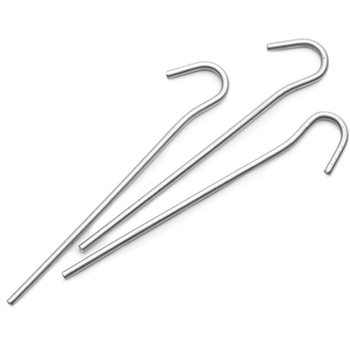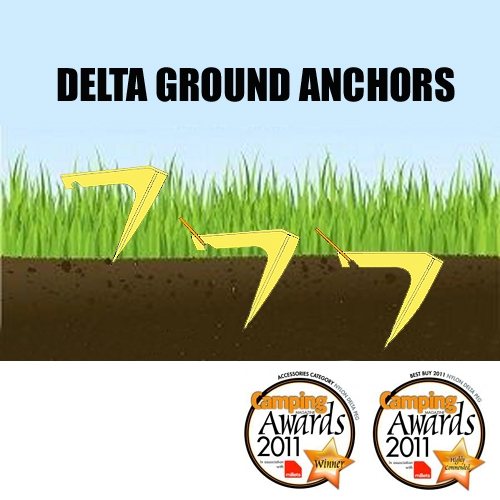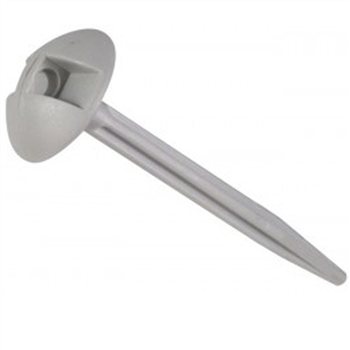
Tent Pegs Explained
Ever wondered what tent pegs you need and why you might need different ones to those supplied with your tent?
In this article we will go through the various types of tent pegs that you can buy. Most new tents are supplied with standard issue pegs suitable for fair weather camping, but hardened campers would always be cautious not to rely on these alone. In fact, most campers with bulging peg bags have learned the hard way that keeping a variety of pegs for different situations is vital to safeguarding your tent, and your camping holiday.
The Standard Roundwire Peg

Supplied with most tents the round wire peg comes in a variety of lengths and is good for medium firm ground such as grass but easily bent on buried stones. Pegs can be made from different strength metals and different thicknesses - the longer, thicker and more expensive the peg, the more strength it will provide.
If you only have round wire pegs in your peg bag then you can cross two pegs at each pegging point to create extra strength in bad weather, so they cross just below the surface.
The Skewer Peg

Similar to the wire peg, the skewer peg also comes in different lengths and the twisted design gives extra grip on the ground. Like the wire peg they can also bend fairly easily on subterranean obstacles, and crossed for extra security.
The Ripple Peg

Great for guy lines on sand and gravel surfaces, ripple pegs provide a greater surface area and more drag resistance than a standard wire peg. The design also works for medium to soft ground such as grass. The ripple design gives extra drag and prevents the peg pulling from the ground both upwards and in the direction of the guyline.
The Delta Peg (Ground Anchor)

Widely regarded as the greatest innovation to hit the peg bag for many years, many campers now swear by the Delta Peg as the saviour of many a tent in extreme conditions. Designed to bury deeper into the ground when under strain, the Delta Peg never lets go! The peg is also designed to sit flush on the ground to minimise trip hazards.
Use the Delta Peg for all your guy lines, or if on a tight budget at least purchase some for your main guys. A well used Delta Peg is one of the best ways to protect your investment in your tent.
See PDF guide here on how to use a Delta Peg most effectively
Plastic Pegs

Another standard staple from many tent manufacturers, the plastic peg actually gives better security than a wire peg, but can only be used in softer ground free from stones. Pegs will bend on rocks, but when in the ground provide excellent grip for both guy lines and the main tent.
Top tip for slightly bent plastic pegs is to 'unbend' them in a bowl of boiling water after your trip rather than throwing them away.
Groundsheet peg

A lightweight, small peg designed to hold your footprint groundsheet in the ground without a raised profile on the peg. The groundsheet peg is low strength peg good for its intended purpose.
Halfround U Peg

A high strength steel peg designed to give maximum resistance and be used in a wide variety of ground conditions. Good for all ground from firm to soft, the steel U peg usually comes in a variety of sizes; the longer the peg the better the grip. Use for all applications on a tent.
Rock Peg

A rock peg is basically a giant nail designed for hard or stoney ground and can be put in with a standard issue hammer rather than a mallet. Great for pitching on hard standing pitches or rocky ground. Some rock pegs have a plastic pegging point at the top which can break over time if hit repeatedly with a hammer, or there is the Outwell Tarzan Rock Peg version with a welded metal T bar pegging point for increased durability.
Screw type rock pegs

These are a variation of the rock peg with an added screw thread on the peg for increased stability and grip. Designed to turn if they hit a stone, the Screw Type Rock Peg can sometimes be inserted with a cordless drill depending if they come with a compatible head.
Screw Pegs

For the lazy camper, screw pegs simply screw into the ground with a cordless drill adaptor or hand wheel attachment. Available in various sizes, screw pegs offer exceptional hold in firm to soft ground, although they cannot be used in concrete, tarmac or rock ground as they will break. For very hard ground a pilot hole can be drilled with a conventional drill bit before inserting the screw peg.
Screw pegs come with a variable height attachment so they can be used securely even when not fully driven into the ground, and are easy to remove by just reversing the drill direction.
Biodegradable Pegs

A variety of degradable pegs are now available which degrade naturally over time if accidentally left in the ground. Great for festival camping, the process takes quite a while so there is no loss to your security whilst camping. Most of this type of peg are made from potato starch or similar products, but are often shorter and more fragile than conventional alternatives due to the nature of construction.
Tent stakes

Often used with backpacking and hiking tents, tent stakes are lightweight alloy pegs designed to offer maximum security in a minimum weight design. Available in various shapes and designs, tent stakes are versatile and allow you to reduce your pack size and overall weight of your peg bag.
Harpoon Peg

A new design, the harpoon peg gives excellent grip on both medium and soft ground, giving a large surface area to prevent drag and extra grip at the base for a tenacity not round on standard wire pegs. Great for sand, gravel and grass